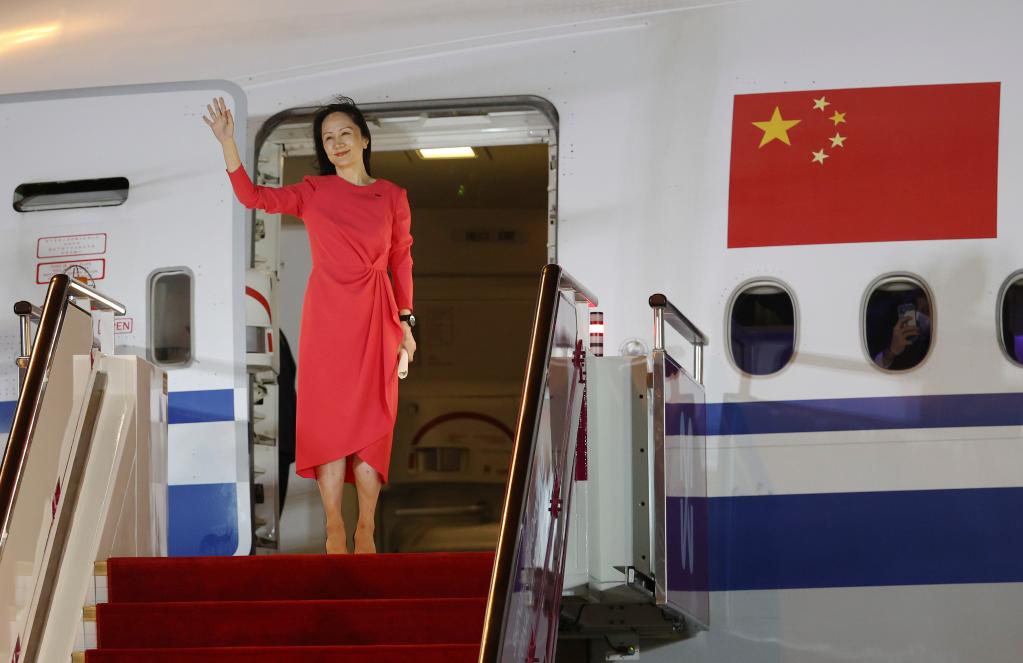
Meng Wanzhou waves at a cheering crowd as she steps out of a charter plane at Shenzhen Bao'an International Airport in Shenzhen, South China's Guangdong province, Sept 25, 2021. [Photo/Xinhua]
By Harvey Dzodin
Some people say the arrest of Huawei Chief Financial Officer Meng Wanzhou by the Canadian government on Dec 1, 2018, at the request of the United States government for allegedly violating US long-arm sanctions against doing business with the Islamic Republic of Iran was a thorn in the side of both Sino-US and Sino-Canadian relations.
In reality, it was much worse than that — more like a festering gangrenous wound that refuses to heal because the scab keeps getting ripped off it.
But the matter is far from being legally settled, a fact overlooked in the current euphoria over a Canadian court dropping the extradition case against Meng after she reached a deferred prosecution agreement with the US administration. To the contrary, the US prosecution of Huawei is likely to accelerate after this brief moment of opportunity when both sides could and should use to depoliticize issues and engage with all stakeholders to solve problems.
From the outset, the Meng case deviated from customary, long-established US government practices. First, the case is a cherry-picked prosecution targeting Huawei that gives the lie to the US' cherished motto of "equal justice under law".
Second, in virtually all cases alleging corporate misconduct contrary to US law, the corporate entity is invariably charged, but no executive is arrested. In Meng's case, however, numerous governments were contacted by the US and specifically asked to detain Meng. Many refused and only Canada complied. It was, as previous US president Donald Trump is fond of saying, "a witch hunt". Only that Trump himself was the hunter in the Meng case.
Later, contrary to statements by other US officials that the detention and trade war were completely separate and unrelated issues, Trump tipped his hand by revealing that Meng was in essence a bargaining chip to exert leverage on China to acquiesce to his terms of surrender in a trade war against China that he initiated. It was not much different from Trump's mafia-like behavior for which he was impeached for withholding military assistance from Ukraine unless its new president did Trump the "favor" of starting a bogus criminal investigation against his most feared opponent, then candidate and now US President Joe Biden, and his son.
Predictably, immediately after the deferred prosecution agreement was signed, North American cold warriors lost no time in demagoguing Meng's release. They called it a sign of weakness on the part of the Biden administration, claiming it had caved in to China. The fact, however, is that the reversal of one of Trump's most brazen actions is more a sign of strength and political courage.
These North American demagogues are the most recent in a long tradition of anti-communist, anti-socialist ideologues. They've been around in one form or another since the 19th century. And it should not come as a surprise that they're mainly racist, white supremacists.
Super-hawk Florida Senator Marco Rubio is one of them and his remarks are typical of his bigoted ilk. He said that "the release of Meng raises serious questions about President Biden's ability and willingness to confront the threat posed by Huawei and the Chinese Communist Party" and demanded a congressional investigation.
It makes much more sense to take immediate advantage of Meng's release to address the many common challenges countries around the world are facing, especially since realistically, it's most likely just a moment of calm in an ongoing storm. These include examining the outmoded and creaky rules which no longer suit the realities of the international order in the 21st century. One of the most pressing needs today is the reform of the World Trade Organization, whose weaknesses were exploited by Trump to cripple it.
This sordid affair is, in fact, a mere chapter in a still evolving horror story, which is bookended by a pair of ironies. Meng's virtual hearing in Brooklyn on Friday that resulted in her deferred prosecution agreement and conditional release was conducted at about the same time as the Quadrilateral security dialogue led by Biden, together with Australia, India and Japan, was held at the White House with the same animus of confronting and containing China.
This story is likely to go on.
The author is a senior fellow at the Center for China and Globalization.

 中文
中文



